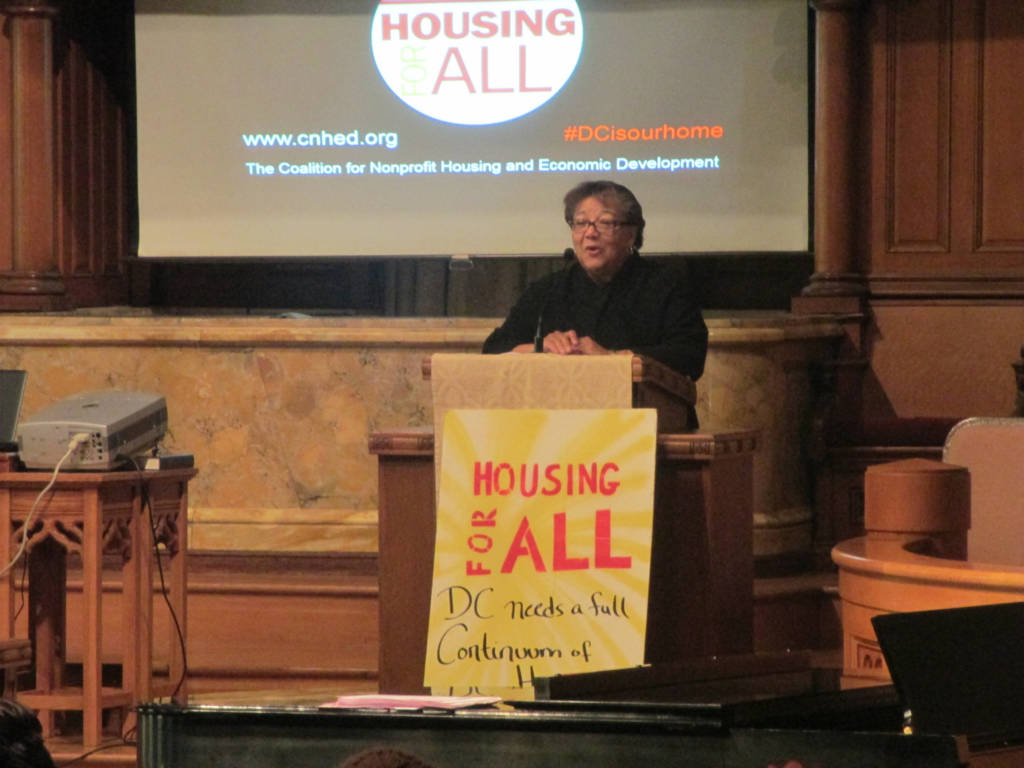D.C. Councilmembers attended a recent 25th anniversary celebration for the D.C. Tenants’ Advocacy Coalition in order to drum up support for the Rental Housing Affordability Stabilization Amendment Act, introduced by At-Large Councilmember Anita Bonds January 10.
The next step for the bill would be hearings before the D.C. Housing Committee, though DCTAC chairman Jim McGrath said in an e-mail he thinks none are yet scheduled. Tenants’ rights advocates and other supporters are pushing for community support to get the bill through the Council to become law.
D.C. is one of the last urban jurisdictions in the country that still has rent control and two-thirds of District residents – roughly 300,000 people – are apartment renters, according to McGrath. These laws protect elderly and disabled tenants, among others, from high rental fees. McGrath warned the crowd assembled at Sumner School that rising rents in low-income communities east of the river are pushing those with lower incomes out to the city’s fringes.
He noted in an e-mail that rents have increased 54 percent on rent-controlled properties in the District in the past 10 years.
“Gentrification is all over the city,” said Ward 7 Councilmember Vincent Gray, “and people are headed to Wards 7 and 8.”
Gray took advantage of the opportunity to reference his past commitments to affordable housing as former mayor of the city, while urging those assembled to support the rental housing amendment.
“We have a lot of work ahead of us; we are the victims of our own success,” Gray said. “The money must be able to go back to the people to enable them to live in the city.” A lot of people in the city want to stay here to live but can’t because rental prices force them out, he explained, describing that for a family whose income is only $35,000 per year, the government’s investment has to be “huge.”
In a show of solidarity for these wards, TENAC unanimously elected Kim Harris of Ward 8 to its board of directors. Harris was applauded for organizing a tenant association at Marbury Plaza Apartments, a low-income rent-controlled complex.
McGrath described the rent control bill as preserving affordable housing in the face of rapid gentrification. It would amend the 1985 Rental Housing Act to eliminate landlords’ ability to increase
rent by up to 30 percent when an apartment becomes vacant – capping that increase instead at 5 percent. It would also hold rent increases on rent-controlled apartments to five percent and remove a 2 percent “add-on” rent increase landlords can choose to implement.
Counclimembers Cheh, Evans, Grosso, Silverman and Trayon White also attended to show their support for the rent control amendment.
Supporting such legislation had to be considered in the context of President Trump’s administration, Gray added. “We have fought so hard for so many things in this city … We have to resolve we will continue to fight. This stuff won’t go around unless we fight to make it go around.”
Though the bonds bill has near-unanimous support from D.C. Council, McGrath of TENAC fears landlord lobbyists. “There is still the sausage making of the legislative process,” he wrote in an e-mail. “Fierce opposition from the strong real estate lobby, the Apartment and Office Buidings Association, may somehow alter things. The lawyers are canny. We should not count our chickens before they hatch.”
Because the District is a sanctuary city, the Trump administration’s crackdown on such could cut off $3.7 billion in Medicaid and other funding for needy D.C. residents, noted Ward 2 Councilmember Jack Evans “The stakes are high; they are really high,” he told the group. He urged citizens to be activists – to go down to the Wilson Building to visit personally with their councilmember.
Joel Cohn, legislative counsel to TENAC’s Office of Tenant Advocacy (OTA), gave examples of what activists can accomplish when it comes to tenants’ rights. He told the assembled that his office had contributed to capping late fees for monthly rental payments at five percent and had removed the ability to evict people just for owing late fees.
Entire communities have been displaced by gentrification projects and the people who depended on those communities have no place to go, according to Parisa Norouzi of Empower D.C. She added that the average age of homeless adults in D.C. is 27.
“Make sure you see the councilmember,” Evans said, “don’t let them pass you off on some staffer.”








